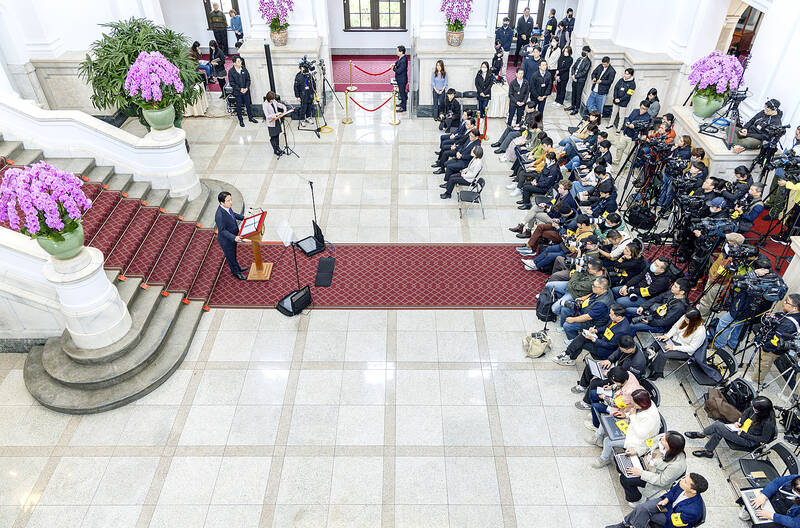The government aims to increase defense spending to at least 3 percent of GDP this year, President William Lai (賴清德) said yesterday, hours after US President Donald Trump again threatened tariffs on Taiwanese semiconductors.
At a news conference in Taipei following his first high-level national security meeting this year, Lai said the government would propose a special budget this year to increase the nation’s defense spending to more than 3 percent of GDP.
“Taiwan must firmly safeguard its national sovereignty, strengthen its resolve for self-defense and bolster its defense capabilities,” he said.

Photo: Presidential Office via AP
The president also vowed to double down on defense reforms and enhance civil protections in the face of growing threats from authoritarian regimes.
Lai’s plans to increase defense spending — which, if successful, would likely see Taipei purchasing more defense articles from Washington — reflects Taipei’s broader efforts to reduce the trade deficit with the US.
The US has approved US$26.26 billion of arms sales to Taiwan over the past eight years, with US$18.76 being approved during Trump’s first term from 2017 to 2021, Lai said.
Taiwan will accelerate efforts to strengthen its national defense capabilities, building on years of close collaboration between Taipei and Washington, he added.
Asked if he was concerned Taiwan could become a “pawn” in the US-China competition, Lai said the nation was “an indispensable member of the world and the region.”
“We are a player, not a pawn,” he said.
His remarks came just hours after Trump, speaking with reporters in Washington after signing a presidential memorandum paving the way for tariffs on US chip imports, reiterated his claim that Taiwan “took our [the US’] chip business away.”
Trump said that the pledged economic sanctions, which could take effect as early as April, would ensure “fair” and “reciprocal” trade, while reducing the US trade deficit in its dealings with other countries over the years.
Taiwan is in the top 10 list of countries with which the US has a trade deficit.
The plans to increase defense spending followed Trump’s comments during his presidential campaign that Taiwan should increase its defense budget significantly and pay the US for protection against China.
Over the past eight years under former president Tsai Ing-wen (蔡英文), the defense budget incrementally increased from NT$365.8 billion (US$11.2 billion) in 2016 to NT$606.8 billion last year. However, the spending still fell short of the 3 percent of GDP pledged by Tsai.
It remains to be seen whether the government’s pledged defense spending hike, which would require legislative approval, would materialize.
For this fiscal year, the Cabinet had earmarked NT$647 billion for national defense, amounting to 2.45 percent of GDP. However, NT$8.4 billion of that figure has been cut by the opposition-led legislature, with another NT$89.9 billion frozen, according to Directorate-General of Budget, Accounting and Statistics estimates.
The legislature has yet to finalize the central government budget plan it passed on Jan. 21 after adopting numerous budget cuts and freezes.

INVESTIGATION: The case is the latest instance of a DPP figure being implicated in an espionage network accused of allegedly leaking information to Chinese intelligence Democratic Progressive Party (DPP) member Ho Jen-chieh (何仁傑) was detained and held incommunicado yesterday on suspicion of spying for China during his tenure as assistant to then-minister of foreign affairs Joseph Wu (吳釗燮). The Taipei District Prosecutors’ Office said Ho was implicated during its investigation into alleged spying activities by former Presidential Office consultant Wu Shang-yu (吳尚雨). Prosecutors said there is reason to believe Ho breached the National Security Act (國家安全法) by leaking classified Ministry of Foreign Affairs information to Chinese intelligence. Following interrogation, prosecutors petitioned the Taipei District Court to detain Ho, citing concerns over potential collusion or tampering of evidence. The

‘FORM OF PROTEST’: The German Institute Taipei said it was ‘shocked’ to see Nazi symbolism used in connection with political aims as it condemned the incident Sung Chien-liang (宋建樑), who led efforts to recall Democratic Progressive Party (DPP) Legislator Lee Kun-cheng (李坤城), was released on bail of NT$80,000 yesterday amid an outcry over a Nazi armband he wore to questioning the night before. Sung arrived at the New Taipei City District Prosecutors’ Office for questioning in a recall petition forgery case on Tuesday night wearing a red armband bearing a swastika, carrying a copy of Adolf Hitler’s Mein Kampf and giving a Nazi salute. Sung left the building at 1:15am without the armband and apparently covering the book with a coat. This is a serious international scandal and Chinese

Seventy percent of middle and elementary schools now conduct English classes entirely in English, the Ministry of Education said, as it encourages schools nationwide to adopt this practice Minister of Education (MOE) Cheng Ying-yao (鄭英耀) is scheduled to present a report on the government’s bilingual education policy to the Legislative Yuan’s Education and Culture Committee today. The report would outline strategies aimed at expanding access to education, reducing regional disparities and improving talent cultivation. Implementation of bilingual education policies has varied across local governments, occasionally drawing public criticism. For example, some schools have required teachers of non-English subjects to pass English proficiency

TRADE: The premier pledged safeguards on ‘Made in Taiwan’ labeling, anti-dumping measures and stricter export controls to strengthen its position in trade talks Products labeled “made in Taiwan” must be genuinely made in Taiwan, Premier Cho Jung-tai (卓榮泰) said yesterday, vowing to enforce strict safeguards against “origin laundering” and initiate anti-dumping investigations to prevent China dumping its products in Taiwan. Cho made the remarks in a discussion session with representatives from industries in Kaohsiung. In response to the US government’s recent announcement of “reciprocal” tariffs on its trading partners, President William Lai (賴清德) and Cho last week began a series of consultations with industry leaders nationwide to gather feedback and address concerns. Taiwanese and US officials held a videoconference on Friday evening to discuss the